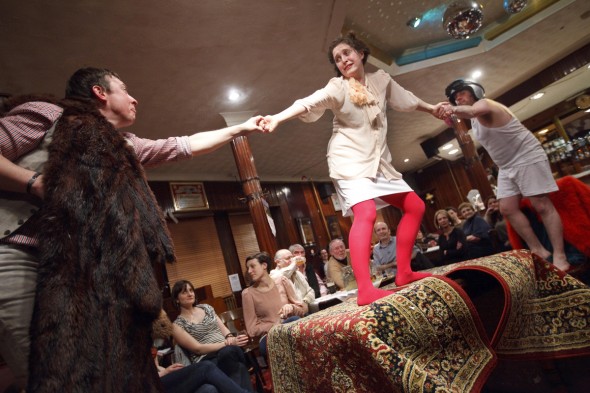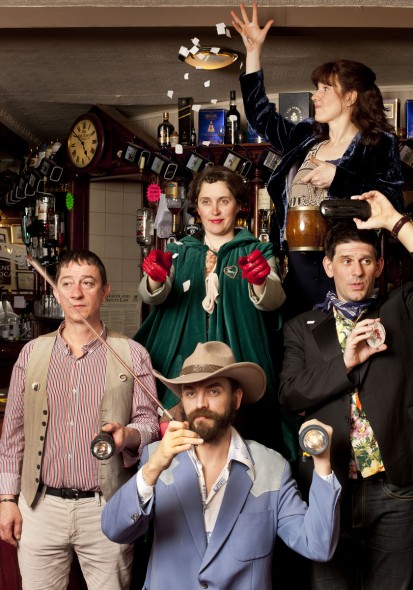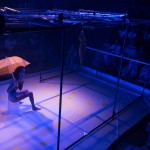How to Dedicate a Ballad
Impressions on The Strange Undoing of Prudencia Hart

(Spoiler awareness mode on)
David Greig’s play The Strange Undoing of Prudencia Hart, directed by Wils Wilson and produced by The National Theatre of Scotland, takes place in alternative spaces like pubs, bars or restaurants. In the Festival Cena Brasil Internacional, in Rio de Janeiro, the stage for this amazing experience was the Cais do Oriente restaurant. A Folk band is already in action while the audience enters the restaurant. The theatregoers have the option to order wine, beer or other beverages during the event. As the audience arrives, the actors welcome them to the tables and eventually engage them in the action of tearing down some napkins to create snow for the journey of Prudencia Hart.
Prudencia is an academic researcher on The Border Ballads, who leaves town to speak at a conference in Kelso where her view on the representation of Hell is not very appreciated. The academic life is pictured with irony showing the scholar community in its worst, with all the intellectual vanity and disputes involving typical ready-made discourses – such as the blind defence of any post-post-post-contemporary theme and the negative rhetorics – “neither Borders, nor Ballads”. In this context, Prudencia is accused of being an old-fashioned, naive defender of dead Ballad values. To complete the ugly picture, she can`t go back home after the Symposium because of a snow storm, and is stuck in Colin Syme’s company, an unpleasant academic colleague and a twitter addict. They find shelter in a local pub to wait for the B&B answer, just to find out it’s wild karaoke night. Worse than that, only Prudencia’s capture by the Devil, but then again, how to compare?
What called my attention regarding the playwriting is the fact that the author doesn’t abandon the conventional storytelling structure – though he makes witty comments on it at the same time – shifting from dramatic proximity and ironic distance. The way the text mentions its own procedures contributes to a more complex form of narrating the story. This consciousness of the narrative process is made present in diverse moments such as when the main character is introduced by the narrators who offer three or four possibilities of a start before sticking with Prudencia´s action of going to the Conference. Latter on the play, the lines in rhyme gain full dramatic function when the heroine discovers the Devil’s low resistance for verse. The same way the traditional tale structure and the witty meta-comments coexist in Greig’s writing, the mundane references are also in dialogue with mythical elements. The play is developed in disconnection with the closed dramatic convention, allowing the actors to also assume the narrator’s roles, as well as to be part of an extended theatrical game throughout mimic, which allows them, for example, to become a car, and eventually to assume other less figurative functions.

The work of the actors-musicians, Andy Clark, Annie Grace, Alasdair Macrae, David McKay e Madeleine Worrall, is, without a doubt, one of the highest points of the play. The cast conducts the interactive premise with ability, constantly transforming the audience into partners of the scene. The complicity of the theatrical pact is often done by eye contact. Sometimes, a single look is enough for the audience of the play to become the particular audience of the fictional Conference of Border Ballads or the strange night clubbers at the karaoke (including in the sing-along moments). It can be said that the eyes of the performers are the main conductors of the make-believe game, giving it a special vivacity, but words and actions have big roles as well, immersing the spectators in the story by not uniquely subtle means. One poor spectator is “ridden” as if he/she was a motorcycle, and another unlucky one is involved in a group mimic of a bacchanal.
Just watching Madeleine Worrall as Prudencia makes it worth going to the theatre. Madeleine pursues intelligent options as an actress – she has a generous approach to the character (embracing the ups and downs situations that the character goes through), but she also punctuates her acting with a clever sense of humour. She manages to connect witty observations (I don’t mean words in the text here, but the actress’ choices: intentions, tone of voice etc.) with very in-the-moment delivery.
It is Prudencia’s encounter with her object of fascination – the Devil – that unchains the great transformation of the heroine. The Devil, owner of many disguises, is played by David McKay – another great actor, which I would say, is as authorial as Madeleine Worrall, avoiding obvious character constructions. The playwriting also give them good material: the Demon first appears as a kind landlord of the B&B and owner of a library which contains ALL THE BOOKS IN THE WORLD – WRITTEN AND UNWRITTEN. The beast captures the academic, and even though Prudencia finds some excitement in the possibility of eternal bibliographic cataloguing, she craves for freedom. Both actors use the characters possibilities of “fissures” or “crack up points” to create some tension with the comic. I have the impression that the audience was laughing, or about to laugh, most of the time during the show, and so, when they are surprised by these “fissure points” of the performance: meaning some seconds of a painful understanding of the actors on the situation of the characters – then a positive re-dimension of the play is given. The privation of Prudencia’s liberty and the Devil’s giving in to love and then the pain he suffers loosing his victim (even when there’s something pathetic about it), are examples of what I am considering “fissure possibilities” of the playwriting. Other moments that also function as a “rift” (not in an emotional sense, but in the way the direction swifts the atmosphere of the play in an unexpected way) is a choreographed scene in which the actors Worrall, McKay and Andy Clark suggest through slow physical movements and the support of beautiful singing, the sexual-romantic involvement between Prudencia and the Devil.
Another significant character is Colin Syme (played by Andy Clark), whose party abilities make him the king of the karaoke night, antagonizing with Prudencia, whose social phobia makes her hide in the ladies’ restroom. But in the end, Colin turns out to be Pru’s (how he calls her) partner in Satan’s defeat. Perhaps, the qualities of a character driven by more superficial interests inhibited Clark’s work in the “fracture zone”, where Worrall and McKay find new layers for their compositions. Anyway, Clark is a great catalyser of the audiences’ engagement with the show, with funny karaoke numbers and references about trendy topics such as Lady Gaga, facebook and the latest tech gadgets.
The encounter, that has the duration of a millennium of imprisonment by Lucifer, or maybe just a few minutes of delirium while Prudencia faints in the snow, is enough for the big transformation of the heroine. Prudencia, who once was helpless not knowing what to sing on that karaoke night, is now back from her weird nightmare in hell, and dedicates a hit of the pop-music to the Devil, the one who has profoundly transformed her. The theory of the implicit interlocutor is the karaoke night’s lesson and it is delivered in this full-of-lust-style through a Kylie Minogue song “I just can’t get you out of my head” that slowly mashes up with the former Folk band music. Story ends.
Even though audience in Rio received the play with great excitement, there was one constant complaint about the translation from English to Portuguese. The subtitles that followed the plays were harmed by the rushed dynamic of the Festival. The usually inadequate translation of words, seen also in other plays during the Festival, became particularly aggravating in The Strange Undoing of Prudencia Hart – in which rhyming and metric precision do have a dramatic function in the play. The philological theme requires bigger investment on the translation, and it deserves to be a priority on International Festivals that are to come.
Having assumed the spoilers, in my defence I can only say that, unfortunately, there isn’t a big chance for the Brazilian readers of the review to see the play if they missed the Festival. Either way, what really makes this play unique is the theatrical experience that escapes from the description. So, whoever still has a chance to see the NTS in action, should not miss it. Get your ticket, order a glass of wine and enjoy one of those rare plays capable of reminding you why you still bother going to the theatre anyway.
References
Festival cena Brasil internacional: http://www.cenabrasilinternacional.com.br/
National Theatre of Scotland: http://www.nationaltheatrescotland.com
Versão da tradução em português: http://www.questaodecritica.com.br/2012/07/como-dedicar-uma-balada/









